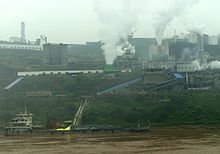Our website is made possible by displaying online advertisements to our visitors.
Please consider supporting us by disabling your ad blocker.
Pollution haven hypothesis

| Part of a series about |
| Environmental economics |
|---|
 |
The pollution haven hypothesis posits that, when large industrialized nations seek to set up factories or offices abroad, they will often look for the cheapest option in terms of resources and labor that offers the land and material access they require.[1] However, this often comes at the cost of environmentally unsound practices. Developing nations with cheap resources and labor tend to have less stringent environmental regulations, and conversely, nations with stricter environmental regulations become more expensive for companies as a result of the costs associated with meeting these standards. Thus, companies that choose to physically invest in foreign countries tend to (re)locate to the countries with the lowest environmental standards or weakest enforcement.
- ^ Levinson, Arik; M. Scott Taylor (2008). "Unmasking the Pollution Haven Effect" (PDF). International Economic Review. 49 (1): 223–54. doi:10.1111/j.1468-2354.2008.00478.x.
Previous Page Next Page


